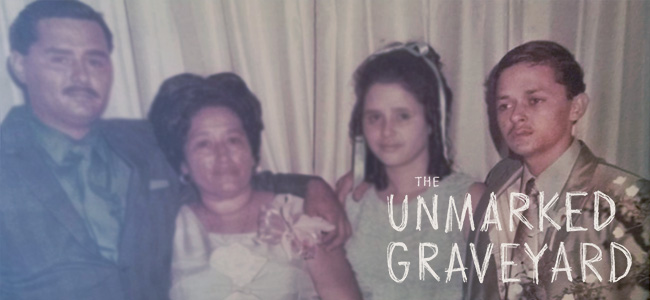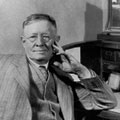JOE RICHMAN (HOST): From Radio Diaries, I’m Joe Richman, and this is the Unmarked Graveyard. A series untangling mysteries from America’s largest public cemetery.
[montage of clips from the series]
RICHMAN: Over a million people are buried on Heart Island. It’s often called a potter’s field. People end up there if their family can’t afford a private burial, or the city can’t find anyone to claim the body. And when New York City gets hit hard by an epidemic, like the flu of 1918, or just recently COVID, Hart Island gets hit hard too.
During the 1980s, the epidemic was AIDS. More than 100, 000 people would ultimately die because of AIDS in New York City alone. Many were buried on Hart Island. Some of their families never found out what happened to them. Today, episode three. One woman’s search for a man she never knew.
[FOG HORN, BOAT ENGINE SOUNDS, BIRDS CHIRPING]
ANNETTE VEGA: Oh my god, that’s the island? It’s crazy. There’s not a lot of land for that many people to be buried.
At first I thought it was eerie. But it’s kind of pretty because the fog just like erases the city. It’s just so beautiful. It’s nicer than I thought.
[BIRDS FADE OUT, MUSIC]
My name is Annette Vega. I’m a registered nurse. I am 52 years old. I will be 53 this month. I grew up in the Bronx. I lived with two of my younger sisters, and my mom and my dad. Dad was always working. He was an electrician for a local three. And he was always the strong guy. And a lot of the neighborhood teenagers looked up to him.
Not everybody had their dad in their life, you know. Looking back at it, I was like, it was a great childhood.
So, when I was about 7 or 8, I found out that my dad wasn’t my biological father. That’s the first time I came to know that there was… Someone else out there. This is a picture of my biological father, Angel Garcia. He looks like he’s in his thirties, and he has a long mustache and a DA. Hair that’s kind of brushed back.
Who was this person? Why hasn’t he been in my life? Could he be looking for me? I just felt a persistent urge to find out.
JEANNE ORTIZ: Hello?
VEGA: Hey mom.
ORTIZ: Hi Annette
VEGA: So did you win that bingo yesterday?
ORTIZ: I won 75 yesterday and 370 something on Tuesday.
VEGA: Wow.
ORTIZ: I wish there was a bingo today.
VEGA: So, I wanted to ask you some questions, if you don’t mind.
ORTIZ: Yeah, go right ahead.
VEGA: Okay. The questions are related to Angel Garcia, who’s my biological father.
ORTIZ: No kidding.
VEGA: No kidding. All right, mother. So, what do you remember about him?
ORTIZ: He was very sweet. He was good to me. He knew he was good looking, and he was sure of himself, and who knows? He had this cologne. Oh my God, it was the best cologne ever.
[fades under]
VEGA [VO]: My mom had me at 16. I was a mistake. Not a mistake, but you know. I was in a planned pregnancy, you know. She was a teenager growing up in the Bronx. And there was a young man, everyone called him Machu. You know, they had a little summer romance. He’d be working in the auto body shop. She’d go home happily with grease on her backside of her shorts.
And I’m like, Mom!
ORTIZ: He talked about Puerto Rico, where his family came from. He talked about the future, uh, when we got married. He was a charmer. Lemme tell you.
VEGA: [laugh] Were there things about me that remind you of him?
ORTIZ: I think you look like him a lot. You had green eyes.
VEGA: Green eyes.
ORTIZ: You had very green eyes like he did.
VEGA: Remember my Monte Carlo, my six cylinder that I would be driving fast. And you’d be like, Oh, you remind me of your father. And I’m like,
ORTIZ: Oh yeah. Cause he used to love to drive. He used to steal cars. And I think he used to steal cars just for the fun of it. Wow. He was a bad boy. So I guess maybe I was into bad boys, who knows?
VEGA: [laugh] Aren’t we all? Do you remember the last time you guys saw each other?
ORTIZ: I’d seen him after I gave birth to you. We hooked up again, and um, he used to pick you up, and talk to you, and we used to go on car rides with you and everything like that.
VEGA: When’s the last time you spoke to him? What was that conversation like?
ORTIZ: All I remember I was, I was insulting him,
VEGA: [laugh] You were insulting him? By what?
ORTIZ: I told him that he was not your father, that he was only a father because he made you, but not because he raised you or supported you. I knew that that would hit him hard. And then he disappeared one day and I went to his job and they told me no, that there was another woman looking for him and all that.
So I never went back, and I never looked for him again.
[MUSIC]
VEGA: I remember my mom telling me he was kind of a tough guy, and she thought that he was in a gang.
[ARCHIVAL SOUND OF MOTORCYCLES]
BILL CURTIS [DOCUMENTARY HOST]: The South Bronx, one of New York City’s roughest neighborhoods, and since the mid 60s, home to an outlaw motorcycle gang who call themselves the Ching a lings.
VEGA:I remember hearing about the Ching a lings. They were notorious motorcycle gang that people were fearful of. I thought he might be with them.
CURTIS: So what does it mean to be a Ching a ling?
MEMBER OF CHING A LINGS: The religion we got is the Ching a ling religion. That’s the only religion we have. Ride our bikes, party, hang out. This is like a family thing.
VEGA: So I literally walked up to the Ching a ling’s house in the Bronx. It’s like painted in black. You know, motorcycles all around, and another guy comes out looking rough. He comes over, he talks to me, and I tell him, I’m trying to find my father. They call him Machu, he has green eyes. Oh, I haven’t seen that dude in years.
Another woman comes out, and she’s, you know, out on the stoop, having a cigarette, and she goes, I remember him. I remember one night we were partying really hard. I got so messed up and he helped carry me upstairs to the bedroom. That man could have done anything to me. And he put me in the bed and put a blanket on me and left.
Nice guy. They wished me luck. They said, I hope you find him.
[ARCHIVAL FADES OUT, MUSIC]
VEGA: I felt kind of silly, looking for so long, without a real reason as to why I was looking for him. I didn’t need him to be my father. I still really wanted to find him. There were thousands of questions. Where’s his family? Do I have brothers? Do I have sisters? Do I have a grandmother? Do I have aunt? Where’s his people?
VEGA: It was late January. I got a message from someone on Ancestry who gave me names. I used the white pages, I used Facebook, and I sent the messages. That evening, my phone rings. I hear this woman crying, emotional. She said, Annette,
all this time my niece, I’ve been looking for you. I was like, you have. You know about me?
[CAR DOORS]
VEGA: Hi, Titi!
So I’m here. I arrived at my Titi’s house. My Titi Miriam, my father’s sister. It’s a really pretty home.
MIRIAM GARCIA: My name is Miriam, Miriam Garcia. My brother is Angel.
VEGA: Angel was your brother. He was younger than you or older than you?
[GARCIA ANSWERS IN SPANISH, VEGA TRANSLATES]
GARCIA/VEGA: Her younger brother. He only went to sixth grade. But there was something about him that he could just pick up things. He learned how to work on cars. He could take a car that was destroyed and make it look like new.
Angel was a good man, but he had a really, really hard life.
There was issues in the home growing up because their father was an alcoholic and my father went to the streets and he started using drugs at the age of 13.
He was arrested and in prison from selling drugs, but it wasn’t like a traditional prison. It was like a camp.
GARCIA/VEGA: So she said in 1985 or 86, police came to the house to tell them that he escaped. They don’t know how he did it, and someone had to have helped him. She said she received a phone call from him in the summer of 1989 that he was very sick with pneumonia and he wanted to come home.
Her and her husband went to New York. They walked through the streets looking for him, but she never heard from him again.
She hasn’t seen him in 30 years. She said, I don’t think he’s alive.
[MUSIC]
VEGA: Okay, so this is what I find out. I received an autopsy report and I actually have it with me and it says, Angel Garcia died August 3rd, 1989 at 11 p. m., 37 years old. Immediate cause of death, pneumonia. Due to AIDS as a consequence of chronic intravenous narcotism. IV drug abuser. It says he was buried in a place called Hart Island.
People are buried there. People with no ID on them. People who haven’t been claimed. And then I spoke to Titi Miriam. We went through it together and she put it down and she said, This is him. You found your father.
[CAR DRIVING BY]
ANGEL GARCIA: Hi.
VEGA: What’s up?
ANGEL GARCIA: Nice to meet you.
VEGA: Yes you too. I can’t believe I’m standing here with my brother. Like his smile, like he’s so cute. Look at him. Thank you. Mwah.
So I found out that I had A brother named Angel. I’ve never met him. He also didn’t know where our father was.
ANGEL GARCIA: She reached out to me and wrote me a letter telling me she was my sister. I was incarcerated. I was incarcerated, so at first I was like, what? What the hell is going on here? She went into detail telling me who she is and how she went about finding me. So all our research have paid off.
VEGA: I know, I should be a private investigator. Ha ha ha. Garcia investigations.
Now we’re gonna go see our father, where he was buried.
ANGEL GARCIA: It’s weird, like, nobody knew where he was at all these years.
UNIDENTIFIED SPEAKER #1: Block 201, section 3.
VEGA: Right there? 201, grave 27. So this is the plot where Angel was buried.
ANGEL GARCIA: Our dad.
VEGA: Our dad. Wow.
ANGEL GARCIA: I was always his biggest fan, like rooting for him. Yeah. I must have been like seven years old. And we went to the prison to visit him. And he took us from the visiting room to, to like the dormitory. He introduced us to all the dudes that was locked up with him or his friends or whatever. He gave me like a boat made out of like wood and that’s the last time that I’ve seen him.
VEGA: The people that loved my father, whether it’s my brother, my aunt, my cousins, everyone talks about how he was such a good guy. I think they were afraid to tell me the bad stuff. Whether it’s being in a gang or in prison, being an IV drug abuser, you know, Angel was not an angel, but it’s who he is. I mean, it’s not a complete story without all of it.
[PLASTIC RUSTLING, MUSIC]
VEGA: I’m putting flowers here at his grave. Just planting and marking. Because he’s here. He’s not lost.
ANGEL GARCIA: I’m happy to see where he lays, and to like, tell him like, YO, Annette found you, she found us, and we here. Now we know who you are.
RICHMAN (HOST): That was Annette Vega and her brother Angel Garcia.
This story was produced by Nellie Gilles. Our team also includes Mycah Hazel, Alissa Escarce, Lena Engelstein, and myself. Our editors are Ben Shapiro and Deborah George.
Sound mixing by Mitra Kaboli. Music in this episode from Roy Brown and from Matthias Bossi and Stellwagon Symphonette. We couldn’t make this series without the help of Melinda Hunt and the Hart Island Project. Visit hartisland. net to learn more. And also, thanks to our broadcast partner, NPR’s All Things Considered.
We’re proud members of Radiotopia from PRX, a network of independent, creator owned, listener supported podcasts. You can hear them all at Radiotopia. fm. Radio Diaries has support from the National Endowment for the Humanities, the Lily Auchincloss Foundation, New York City’s Department of Cultural Affairs, and from listeners like you.
Coming up on the Unmarked Graveyard, the woman who has led the charge to open up Heart Island.
UNIDENTIFIED SPEAKER #2: The importance is… For me, reframing this terribly dark image of a place that is so damaging to so many people so that they believe that their life matters to the city of New York. That the lives of their relatives matter.
RICHMAN: I’m Joe Richman of Radio Diaries. See you next week.








